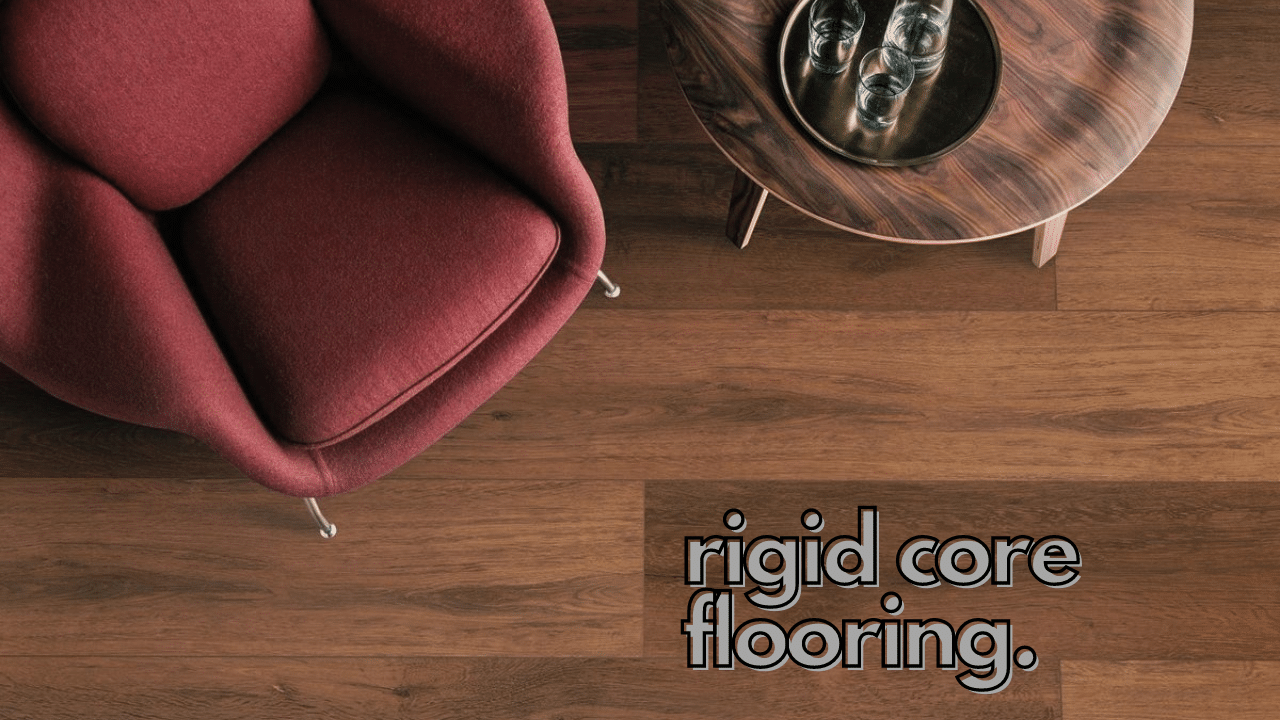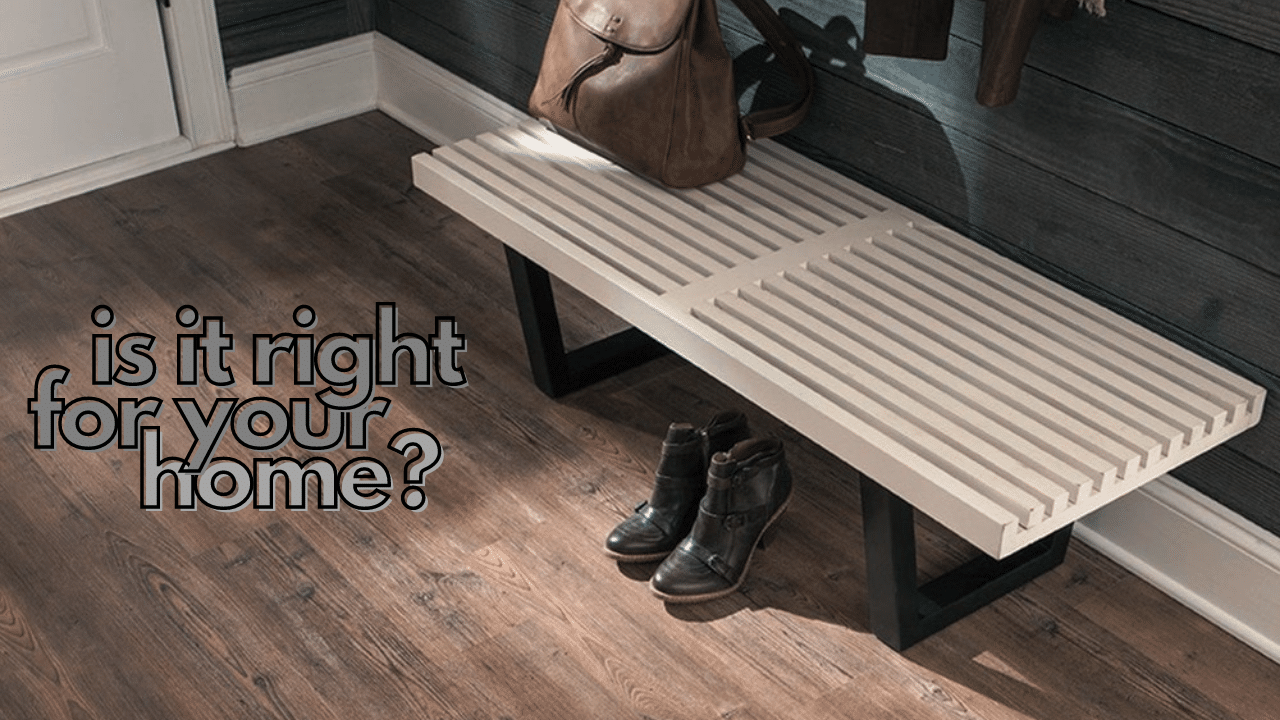Homeowners often find themselves confused with luxury vinyl, engineered vinyl, and rigid core vinyl.
If you’re not familiar with vinyl floors, these terms can often be interchanged. One of the most recommended luxury vinyl floors is the rigid core flooring, a cost-effective option starting from $1.7 to $9 per square foot. It is renowned for being highly durable, with a four-layer composite core.
Let’s delve deeper into everything you need to know about rigid core floors, including their pros, cons, and average costs.
Rigid Core Flooring Average Cost
On average, rigid core vinyl planks range from $1.7 to $9 per square foot. It is relatively cheaper than solid hardwood or natural stone tile floors.

For context, rigid core luxury vinyl flooring costs may vary based on different factors. This includes the thickness, wear layer construction, attachment of a cork underlayment, and the particular design.
5 Layers of Rigid Core Luxury Vinyl Flooring
Rigid core floors are one vinyl plank flooring type with a solid-composite core. This replaces the traditional flexible vinyl core in earlier sheet vinyl flooring materials. It is notably more durable and harder, also known as EVP (Engineered Vinyl Plank) flooring. (Related: EVP Flooring for Your Home: Pros, Cons & Costs)
Note: Most flooring products marketed as LVP (Luxury Vinyl Plank) and Luxury Vinyl Tile (LVT) flooring usually have rigid core construction.
These are composed of five layers that have their distinct function and purpose.
1. Wear Layer
First, we have the top layer of EVP flooring planks that you directly step on. This serves as a protective layer against dents and scratches.
The thicker your wear layer, the more wear-resistant it is. Some premium wear layers also offer UV protection to avoid fading and discoloration given frequent sunlight exposure. That said, this layer is also called the sun protection layer.
2. Vinyl Topcoat Layer
Next, we have a thin waterproof layer that protects your floor from the damage brought about by moisture.
3. Design Layer (Printed Vinyl Layer)
This layer contains various colors or patterns to determine how the floor will look. Generally, it mimics the appearance of natural hardwood floors. It’s why rigid core floors are considered faux wood or faux stone tiles.
Some manufacturers even leverage the Embossed-In Register (EIR) technology to copy the wood or tile flooring texture they desire.
4. Core Layer
The next layer can either be WPC (Wood Polymer Composite) or SPC (Stone Polymer Composite). WPC core mixes natural wood pulp, plasticizers, and foaming agents. This layer features excellent stability and a comfortable underfoot feel.
Meanwhile, limestone powder and plastic stabilizer construction create an SPC core. This makes for rugged, durable floors. Both WPC and SPC are entirely moisture-proof. These can mask subfloor imperfections, including uneven surfaces.
If you’re wondering about the main difference between the two rigid core types, SPC has a stiffer underfoot feel than WPC. Hence, underlayment is usually featured to solve this issue in SPC rigid core floor planks or tiles.
5. Underlayment (Base Layer)
This bottommost layer is found in most rigid-core vinyl flooring planks, although not all. It is commonly made of cork material due to its softer underfoot feel and its heat insulation and soundproofing features.
The purpose of a base layer is to give padding for the planks to be installed on the subfloor properly.
Advantages of Rigid Core Flooring
Let’s discuss the pros of using rigid core vinyl flooring at home.
Disadvantages of Rigid Core Flooring
Much like other engineered wood floors, rigid core flooring also has its set of setbacks to consider. Here are some of them.
Is Rigid Core Luxury Vinyl Flooring the Right Choice for your Home?

Undoubtedly, rigid core luxury vinyl flooring proves to be an excellent investment for homeowners looking for affordable, long-lasting new floors.
You’ll benefit from its easy maintenance, especially if you find cleaning a tedious chore to do. And with its strong core, this flooring option is suitable for use in high-traffic areas in the home.
Frequently Asked Questions (FAQs)
Is Rigid Core Flooring waterproof?
Yes, such type of flooring is 100% waterproof. However, be aware that gaps along the sides of your vinyl flooring are spaces where water can seep through and deal with moisture damage in the subfloor. Always remember to use moldings to seal gaps along the flooring’s edges.
What is rigid core flooring made from?
Rigid core vinyl, also known as Stone Plastic Composite (SPC), consists of multiple layers with different benefits in each one of them. The layers are composed of rigid limestone core for better durability, luxury vinyl print to achieve the desired aesthetic and look, and the very top layer is made of quartz enhanced urethane coating for additional protection.
What rooms are suitable for rigid core vinyl?
Suitable for underfloor heating systems up to 27oC and 100% waterproof, this gorgeous floor can be used in any room in your home. Rigid core vinyl can handle it all, from your bustling living room to your serene bathroom. This excellent floor is 100% waterproof and is suited for an underfloor heating system not exceeding 27C. Rigid core vinyl can handle any room you have at home, from the busy and energetic living room to your comfortable bathroom.
